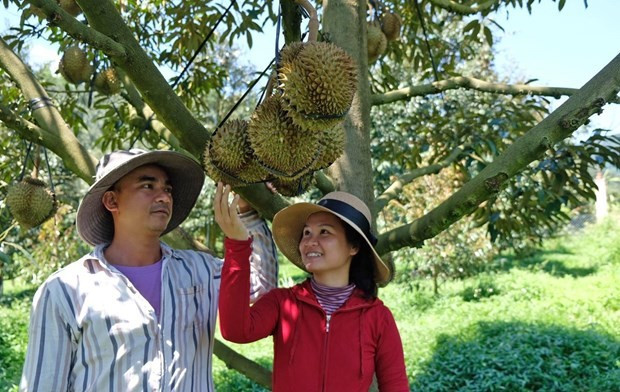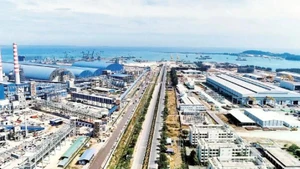According to the Ministry of Agriculture and Rural Development, vegetable and fruit exports were estimated at 1.97 billion USD in the first five months of 2023, up 39% over the same period in 2022. It is forecast that vegetable and fruit exports will continue to advance in the second half of 2023 when many markets around the world are expected to increase imports again.
Steady increase in various types of goods
According to the Ministry of Industry and Trade, most of the exported fruits and vegetables recorded good growth rates in the first four months of 2023.
Fruit led in terms of export value with 920.7 million USD, up 15.7% over the same period in 2022. Only dragon fruit and banana posted declines in export value in the first four months of 2023.
Meanwhile, the export value of durian soared strongly, reaching 190.5 million USD, up 573.1% over the same period in 2022.
Durian is mainly exported to China, accounting for 84.3% of the total durian export value, thanks to the signing of a protocol on phytosanitary requirements for durian exports from Vietnam to the Chinese market, in July 2022. Vietnam has suggested China should open the door to other fruit and vegetable products such as pomelo, fresh coconut, avocado, lemon, pineapple, star apple and others, to further promote the export of vegetables and fruits to this market.
Regarding processed fruit and vegetable products, the export turnover reached 356.4 million USD in the first four months of 2023, up 22.9% over the same period in 2022. This segment has always maintained a good growth pace with great development potential due to people’s increasing demand for processed fruits and vegetables.
Therefore, exporters need to focus on exploiting this segment, contributing to raising the export value of the fruit and vegetable sector in the future.
According to the General Secretary of the Vietnam Fruit and Vegetable Association Dang Phuc Nguyen, fruit and vegetable export is forecast to continue to grow strongly in the coming months due to increasing domestic production and import demand.
However, the output increase requires localities and businesses to actively grasp information, tastes and market needs, to build sales and trade promotion plans for specific types of products, with large output in the main season.
Expanding markets and potential products
Besides durian, dragon fruit, and passion fruit, Vietnam also has the opportunity to promote the export of other potential products, such as avocado.
According to the Food and Agriculture Organisation of the United Nations (FAO), global avocado exports are forecast to reach 3.9 million tonnes, worth 8.3 billion USD by 2030, making avocados an important tropical fruit product in the global fruit trade and one of the most valuable fruit commodities.
Global avocado production is anticipated to hit 12 million tonnes by 2030, more than three times higher than in 2010. The United States and the European Union are expected to be the main avocado import markets by 2030, with imported avocados accounting for more than 70% of total global avocado imports.
Demand from other markets, such as China and the Middle East, is also predicted to expand significantly, opening new opportunities for Vietnam to promote avocado production and export. Vietnam also needs to boost exports to Europe, as well as China's large and potential traditional market.
According to the European Union’s statistical office (Eurostat), the EU’s imports of vegetables, tubers and fruits in the 2018-2022 period rose steadily over the years, with an average growth rate of 4.9% per year. Particularly in 2022, import turnover was posted at about 112.9 billion USD, up 9.6% compared to 2021.
However, Vietnam is only ranked 50th among the markets supplying vegetables and fruits to the EU. Accordingly, imports from Vietnam in 2022 only accounted for 0.2% of the total import value of the EU. It can be seen that there remains a lot of room for Vietnamese fruits and vegetables to enter the EU market because the size of this market occupies 43% of the global trade value of fruits and vegetables. On the other hand, EU consumption demand is spread throughout the year and depends largely on imports from outside.
With advantages from the EU-Vietnam Free Trade Agreement (EVFTA), Vietnam can enjoy the elimination of up to 94% of tax lines for vegetables and fruits (previously with a tax rate of 10-20%), creating a great competitive advantage compared to other exporting countries. However, Vietnamese vegetables and fruits must fully meet the high standards of the EU market to penetrate this market. In addition to quality issues and food hygiene and safety, products must meet environmental requirements such as sustainable production, low emission and social responsibility.
















